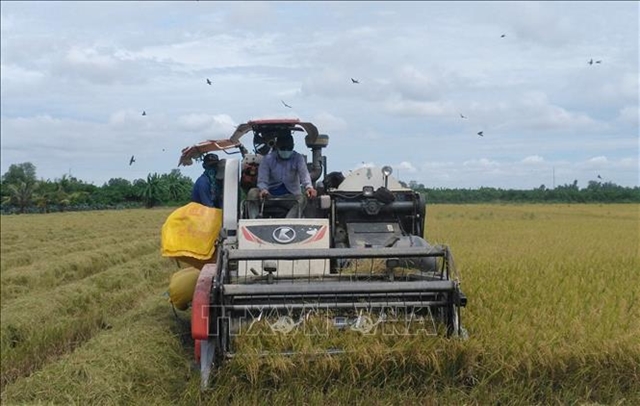 Society
Society

 |
| Around 7,700 ha of the summer-autumn rice crop in Đồng Tháp Province have been plagued by whiteflies, causing young plants to die and reducing rice yields. VNA/VNS Photo Nguyễn Văn Trí |
ĐỒNG THÁP — Some 16,000 ha out of the 100,000 ha of summer-autumn rice crop in the Mekong Delta province of Đồng Tháp have been damaged by pests and diseases, resulting in decreased output.
Around 7,700 ha have been plagued by whiteflies, a moth-like, sap-sucking insect that stunts or even kills plants.
The pest has mostly infested one-month-old rice crops, especially the OM 18 and Đài thơm 8 varieties.
Nguyễn Văn Mong, who grows OM 18 rice in Cao Lãnh District’s Mỹ Thọ Commune, said whiteflies have damaged around one hectare of his fields, killing young plants mostly in their flowering stage.
The pest has been around for two years, and could devastate 10-30 per cent of a field, and farmers have yet to find an effective solution, he said.
Nguyễn Thanh Hiền of Thanh Bình District’s Tân Phú Commune said whiteflies have dried out flowers on his two-hectare rice field, and output is likely to fall by 500 kilogrammes per hectare to six tonnes.
The province Department of Agriculture and Rural Development said large populations of whiteflies are due to abnormally high moisture and lack of sunshine.
It is also because farmers use pesticides when plants are only 10-15 days old, which is too early and kills off pests’ natural predators.
The number of whiteflies is forecast to increase rapidly in the next few weeks during the rainy season, the department warned.
To tackle the problem, it instructed farmers to adopt preventive measures such as the “three reductions, three gains” (3R3G) technique, tracking plant health, applying suitable watering methods, and using organic fertilisers to prevent whiteflies from spreading, save production costs and grow safe produce.
The 3R3G approach promotes a reduction in the use of seeds, fertilisers and insecticides and helps increase farmers’ incomes, lower risks caused by pesticides and improve the environment with less pollution from farm chemicals.
The department also urged farmers to keep an eye on other varieties that are prone to whiteflies, such as Jasmine 85, VD 20, OM 4900, IR 50404, and sticky rice, remove grass from their fields and ensure regular irrigation.
Regular care and inspections are also needed to promptly prevent whiteflies from spreading and devise suitable solutions, it added. — VNS